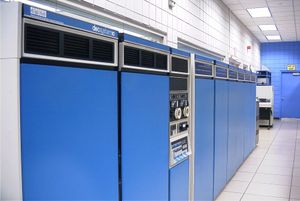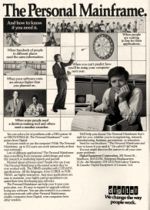Difference between revisions of "PDP-10"
(Add David Bridgham's KV10) |
(Add list of software simulators) |
||
| Line 28: | Line 28: | ||
* David Bridgham: [http://pdp10.froghouse.org/ KV10 (in progress)] | * David Bridgham: [http://pdp10.froghouse.org/ KV10 (in progress)] | ||
* Angelo Papenhoff: [https://github.com/aap/pdp6 FPDPGA-6] | * Angelo Papenhoff: [https://github.com/aap/pdp6 FPDPGA-6] | ||
| + | |||
| + | ==Software simulators== | ||
| + | |||
| + | * S W Galley: [http://dl.acm.org/citation.cfm?id=803947 virtual machine PDP-10] | ||
| + | * Megan Gentry: sim10 | ||
| + | * Stu Grossman: [http://github.com/brouhaha/kx10 kx10] | ||
| + | * Ken Harrenstien: [http://github.com/PDP-10/klh10 KLH10] | ||
| + | * Eric Smith: (unfinished) | ||
| + | * Daniel Seagraves: e10 | ||
| + | * Tim Stark: [http://ts10.sourceforge.net/ ts10], [http://github.com/fsword7/mse MSE] | ||
| + | * Bob Supnik: KS10 simulator for [http://github.com/simh/simh SIMH]. | ||
| + | * Richard Cornwell: KA10 and KI10 simulators for SIMH | ||
| + | * Angelo Papenhoff: [http://github.com/aap/pdp6 PDP-6 simulator] | ||
| + | * Bruce Baumgart: [http://www.saildart.org/j5/index.html WAITS reenactment] | ||
| + | * Jeff Parsons: [http://github.com/jeffpar/pcjs PCjs] | ||
| + | * Mark Garrett: [http://github.com/gcsgithub/titan TITAN] | ||
==External links== | ==External links== | ||
Revision as of 06:45, 12 January 2018
A series of large, 36-bit mainframe-like systems built by DEC; they were basically a re-implementation of the earlier PDP-6 architecture, whose engineering had been a failure. (The machines were so similar at the programming level that PDP-6 code could run on a PDP-10.)
DEC sold 4 different generations of PDP-10 processors: the KA10, the KI10, the KL10, and the KS10. The first three were marketed as the DECsystem-10, running the TOPS-10 operating system; the third was also sold as the DECSYSTEM-20, running TOPS-20. (The varying capitalization was the result of a trademark infringment suit.)
Two other very important operating systems also ran on PDP-10's: MIT's ITS (a very advanced system, from whence came EMACS, and much more besides), and TENEX, which DEC later turned into TOPS-20.
PDP-10s were very important machines on the early Internet, being one of the few (relatively!) cheaply available machines which could run a full NCP and later TCP/IP stack as a multi-user environment at the time.
They still have a large following today. There are several goodsimulators available, notably SIMH and KLH10.
Commercial clones
- Xerox PARC: MAXC
- Foonly: F-1, F2, F3, F4, F5 (unfinished)
- Systems Concepts: SC-30M, SC-40
- CompuServe: JRG-1 (unfinished)
- XKL: TOAD-1, TOAD-2
Hobbyist recreations
- David Conroy: PDP-10/X
- Neil Franklin: (unfinished)
- Rob Doyle: KS10 FPGA
- David Bridgham: KV10 (in progress)
- Angelo Papenhoff: FPDPGA-6
Software simulators
- S W Galley: virtual machine PDP-10
- Megan Gentry: sim10
- Stu Grossman: kx10
- Ken Harrenstien: KLH10
- Eric Smith: (unfinished)
- Daniel Seagraves: e10
- Tim Stark: ts10, MSE
- Bob Supnik: KS10 simulator for SIMH.
- Richard Cornwell: KA10 and KI10 simulators for SIMH
- Angelo Papenhoff: PDP-6 simulator
- Bruce Baumgart: WAITS reenactment
- Jeff Parsons: PCjs
- Mark Garrett: TITAN

